Opioid use disorder is a treatable chronic medical condition. It can be treated just like other diseases, such as diabetes or high blood pressure.
You have treatment options in Rhode Island for opioid use disorder, like medications and behavioral therapy. Medications like methadone, buprenorphine, and naltrexone can be used to treat opioid use disorder. Different medications for opioid use disorder work slightly differently in the brain and body. People can safely take these medications for months to years. Check with your healthcare provider about which medication is right for you. If you want to stop or change your medication, you should first talk with your healthcare provider.
Want to learn more?
Find an Opioid Treatment Program
Learn about Opioids
Help A Loved One
Medications and other treatment options:
Call or text The 988 Lifeline or chat 988lifeline.org. Hablamos español.
Call the 24/7 Buprenorphine Hotline at 401-606-5456
What are the facts about medications?
Medication reduces your risk for overdose.
Medication helps prevent overdose. The use of methadone or buprenorphine results in reductions in overdose death by more than 50%. In Rhode Island, we have a 24/7 buprenorphine hotline that you can use to get connected to buprenorphine.
Medication improves your life and future.
Not only do these medications reduce risks of overdose and overdose death, but they have been associated with improving peoples’ ability to gain employment and reductions in involvement with the criminal legal system. Our state is a national leader in offering MOUD to people in prisons and jails.
Medication will not disrupt your life.
Medication can help your recovery by improving your quality of life. Medication can prevent withdrawal and cravings and help you abstain from other opioid use. By controlling opioid withdrawal and cravings, these medications can help people stop their use of non-prescribed opioids, such as heroin, fentanyl, or oxycodone.
Medication can help you achieve long term recovery.
Research shows that long-term use of these medications can help prevent a return to use and give you the greatest chance of long-term recovery. These medications have been proven to be the most effective treatments available for opioid use disorder and are often used in combination with counseling and behavioral therapies.
Medication works with your clinical and peer supports.
It’s important to have many different forms of support during your MOUD journey. Support can come from different places, including peers in recovery, clinicians, and family members. Learn more about how to connect with clinical and peer support in Rhode Island.
What is the difference between each medication?
Medications help to block the effects of opioids. They can also ease withdrawal symptoms or cravings. But there are differences in how each is taken and prescribed. You can get any of these medications in Rhode Island. Click each medication to learn more:
Buprenorphine
Before taking Buprenorphine you may need to go through minimal withdrawal (8 to 48 hours). Buprenorphine can be prescribed to you by any healthcare professional who is licensed to prescribe. It can be obtained at a pharmacy and taken at home just like any other medication. Buprenorphine is taken as a sublingual (under-the-tongue) tablet, film, or via injection. This medication will usually involve fewer healthcare visits. Buprenorphine might be a good option for you if you are pregnant or breastfeeding.
Methadone
Starting methadone may require you to go through minimal opioid withdrawal. You can only receive methadone at licensed treatment facilities. Methadone is typically given as a drinkable liquid or tablet. Methadone might be a good option for you if you are pregnant or breastfeeding.
Naltrexone
Naltrexone is an extended-release medicine that is injected into your muscle. You can start taking naltrexone when opioids are no longer in your body. Naltrexone can be prescribed by any healthcare professional licensed to prescribe. Naltrexone may be the right medication for you if you cannot get to healthcare appointments frequently, and want to do a monthly injection.

Opioid Treatment Programs
You can get buprenorphine, methadone, or naltrexone at an opioid treatment program (OTP). OTPs that provide treatment and counseling services. They also provide medical and rehabilitative services with oversight and required counseling. You can get buprenorphine, methadone, or naltrexone at an OTP. You can also get buprenorphine or naltrexone from a doctor’s office.
